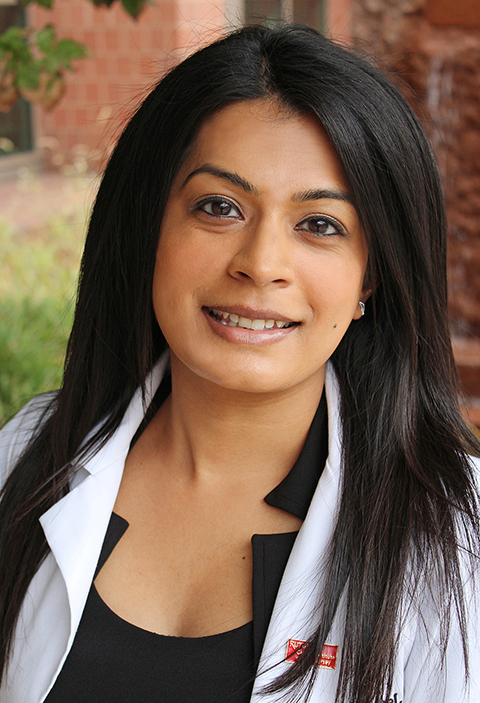New physicians add to a wide range of expertise in cancer treatment at Robert Wood Johnson University Hospital Hamilton.
Malini Patel, MD, officially joined The Cancer Center at Robert Wood Johnson University Hospital (RWJUH) Hamilton in June as the Director of Medical Oncology. Dr. Patel was previously a medical oncologist at Rutgers Cancer Institute of New Jersey. Her appointment was just one piece of the enhanced alignment between The Cancer Center and Rutgers Cancer Institute. In addition to Dr. Patel, several nationally recognized disease-specific cancer specialists from Rutgers Cancer Institute are also now providing patient care at The Cancer Center as well.
As the state’s only National Cancer Institute-Designated Comprehensive Cancer Center, Rutgers Cancer Institute, together with RWJUH Hamilton, provides patients with the most advanced treatment options close to home. In addition to the nationally renowned physicians, patients at The Cancer Center will continue to benefit from:
- The strong alliance between RWJUH Hamilton, RWJBarnabas Health and Rutgers Cancer Institute, which offers access to treatments including precision medicine, immunotherapy, complex surgical procedures, sophisticated radiation therapy techniques and novel clinical trials, many of which are not available elsewhere
- An integrated, multidisciplinary cancer care model featuring providers who have exceptional knowledge and skill with advanced therapies to treat routine, rare and complex cancers
- A beautifully appointed Cancer Center that attracts nationally renowned specialists who provide exceptional care in a compassionate, welcoming environment with the latest in patient centered treatment and technology
- Resources offered at no cost to help patients and families navigate their unique cancer journeys, including dedicated, disease-specific patient navigators; support groups; and a robust holistic healing program
- A single location where patients can see their doctors, undergo outpatient treatment, make use of oncology support services and participate in promising cancer research studies.
At the core of these services is the cancer team, which, in addition to new doctors from Rutgers Cancer Institute, includes familiar cancer specialists with long histories of providing care to RWJUH Hamilton patients. They’re joined by a team of nursing and support staff who provide the highest level of quality care and a healing culture. Comprising the team are:

Director, Medical Oncology
SPECIALIZES IN: medical oncology;
lung cancer; head and neck cancer;
clinical trials

Program Director, The Cancer Center
at RWJUH Hamilton
SPECIALIZES IN: surgical oncology;
breast cancer

Chief, Gynecologic Oncology
SPECIALIZES IN: fertility preservation;
management of vulvar, vaginal, cervical,
uterine, tubal and ovarian cancers;
minimally invasive surgeries (robotics);
complex gynecologic surgeries;
clinical trials

SPECIALIZES IN: medical oncology;
breast cancer; cancer genetics;
clinical trials

SPECIALIZES IN: hematology/oncology;
leukemia; non-Hodgkin lymphoma;
Hodgkin lymphoma; blood cancers

SPECIALIZES IN: radiation oncology

SPECIALIZES IN: radiation oncology
NCI Desgnation: What It Means to YouJust 51 of the thousands of U.S. facilities that have cancer programs are designated by the National Cancer Institute as Comprehensive Cancer Centers. Rutgers Cancer Institute of New Jersey, with RWJBarnabas Health, is among that prestigious group—and the only one in New Jersey. That tells patients they can expect:
|
What Is Multidisciplinary Cancer Care?Cancer can be complicated—and so can cancer care. Multiple health care providers often get involved, creating potential for poor communication or coordination. That’s why cancer care experts at Rutgers Cancer Institute of New Jersey and RWJUH Hamilton follow a model known as multidisciplinary cancer care. “Providers take an integrated team approach in which a mix of specialists from different fields consider all relevant treatment options collaboratively to come up with an individual plan that’s best for a given patient,” says Malini Patel, MD, Director of Medical Oncology at The Cancer Center at RWJUH Hamilton. “Multidisciplinary care fosters communication and information sharing, which in turn can expand perspectives and promote innovative solutions.” Doctors aren’t the only contributors. The multidisciplinary team at The Cancer Center at RWJUH Hamilton also includes providers such as nurse practitioner Vivian Owusu- Mensah, DNP, APN-BC, OCN, CTTS, who works in oncology and breast care, and nurse navigator Patty Hutman Parker, BSN, RN, OCN, who helps patients negotiate the multidisciplinary world of cancer care, especially for breast and gynecologic cancers. Research suggests multidisciplinary care offers a number of potential benefits to patients over less collaborative approaches to cancer care, including:
“Perhaps most important,” Dr. Patel says, “this model of care is associated with high patient satisfaction.” |
